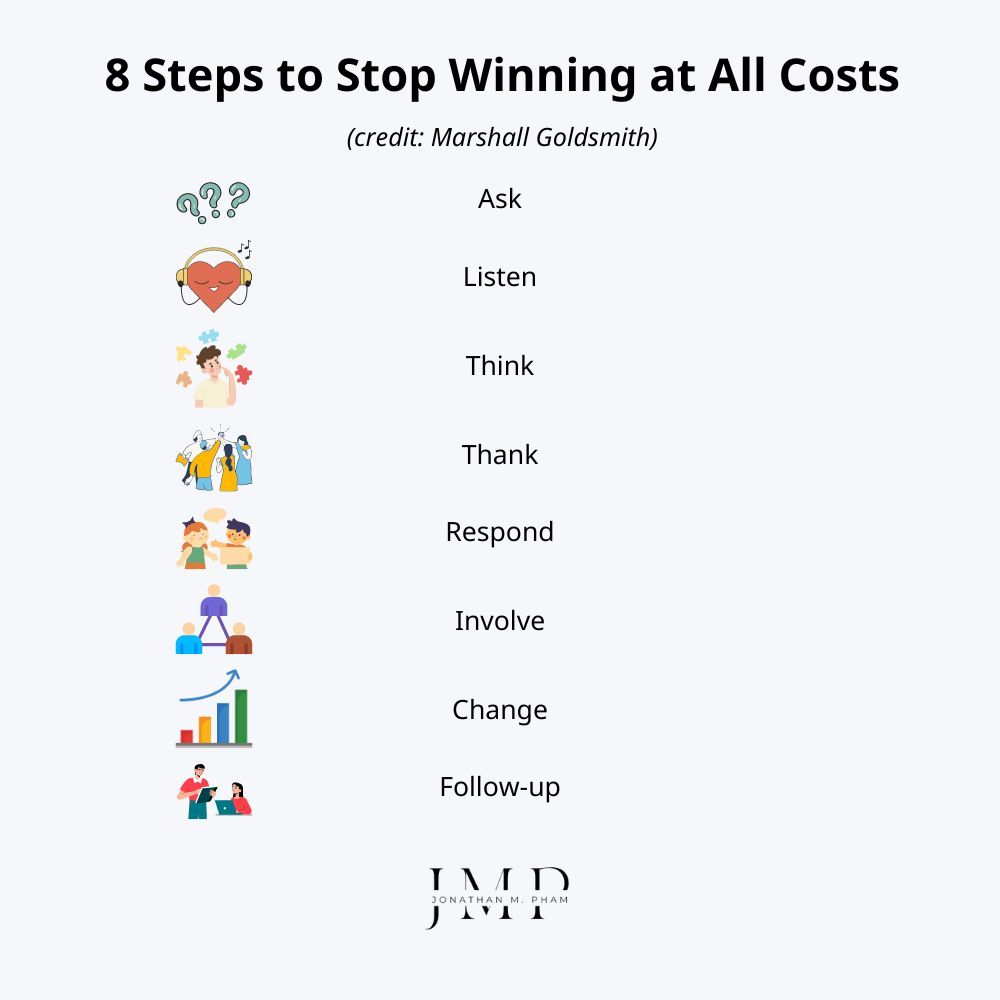Explore the dangers of winning at all costs mentality – plus insights on how to break free from this detrimental mindset.
In today’s competitive world, the drive to succeed and outperform is often celebrated and encouraged. It’s true that ambition and the thirst for victory can be powerful motivators, pushing individuals and teams to accomplish remarkable feats. However, when winning becomes an obsession that overrides everything else, it poses serious threats to one’s professional growth and relationships with others. In fact, the desire to win at all costs has been identified as one of the foremost destructive habits that hinder one’s progress toward success.
Highlights
- “Winning at all costs” refers to the mindset of prioritizing victory over everything else, even at the expense of relationships, personal growth, and a true understanding of the situation. It is a surprisingly common mentality that creeps into all aspects of life, harming our relationships and leaving us ultimately unsatisfied. Those who are in management positions/ have attained a certain level of success are especially susceptible to this bad habit.
- Our desire to win often stems from our ego’s need to be seen as victorious (and fear of being perceived as weak), even if it is completely pointless and will ultimately lead to negative consequences.
- Trying to win at all costs is a self-defeating behavior – it sacrifices long-term success and healthy relationships in exchange for short-term ego boosts. To overcome this harmful mentality, we need to focus on building strong relationships through empathy and open communication, even if it means letting go of being right sometimes.
- By humbly seeking and acting on feedback from others, we can transform ourselves from a narcissistic leader/ team member into one focused on growth and collaboration.
What Does ‘Winning at All Costs’ Mean?
The relentless pursuit of victory – regardless of the consequences – is a pervasive and detrimental behavior commonly observed among leaders and successful individuals in their respective fields. While striving for progress is commendable, there exists a delicate balance between being future-oriented and overly competitive, distinguishing between necessary triumphs and unnecessary ones.
Unfortunately, most of us tend to recklessly tread across this line far too frequently.
Perhaps you can recall instances of discourse where genuine communication is absent, replaced by a restless desire to impose one’s ideas upon the other party. In such scenarios, the craving to prove oneself right becomes paramount, irrespective of the toll it exacts.

Winning – at what cost?
Consider the following examples:
Example 1:
You would like to dine at Restaurant A, while your spouse insists on visiting Restaurant B. As the disagreement escalates, tensions rise.
Ultimately, you both compromise and visit restaurant B, albeit with a lingering sense of dissatisfaction. The dining experience proves lackluster, with abysmal food and woeful service that leaves much to be desired. Instead of peacefully savoring your meal, you find yourself criticizing your partner and blaming them for the unfavorable outcome.
Example 2:
After completing a taxing workday, your spouse shares their grievances about their own challenging day. Rather than expressing empathy, your response is laced with a dismissive remark:
“You complain like that, but do you have any idea of the countless hardships I endured throughout the day?”
The underlying issue lies in our inclination to win no matter the costs – by constantly seeking validation for our perpetual state of misery compared to those around us.
In essence, the concept of “winning at all costs” is a perilous mindset that jeopardizes healthy relationships and personal growth. It hinders genuine understanding and collaboration, replacing them with a relentless pursuit of victory that often leads to unnecessary conflicts and dissatisfaction.
For those looking to reach greater heights in their professional journey, we need to recognize and temper this aggressive tendency – in order to foster an environment of mutual respect, empathy, and meaningful dialogue.

Is it important to win at all costs?
How Often Do We Succumb to This ‘Winning at All Costs’ Mentality?
It may elude our attention, but the truth remains that we frequently succumb to the insidious bad habit in various aspects of our lives. Within the confines of our homes, disputes arise between spouses and even with our children – often triggered by seemingly inconsequential matters like personal hygiene habits.
Within the professional realm, during meetings, we are driven to assert and defend our personal viewpoints at any expense, hijacking the focus from productive collaboration to the dominance of individual presenters. Even in daily life situations – such as waiting in line at the supermarket checkout counter, we relentlessly strive to choose the quickest queue, forsaking patience and consideration for others.
Most – if not all – of us are subjected to the troubling tendency to emerge as “victors”, even when our conscience acknowledges the wrongfulness of our actions. We persistently disregard the impact that our words/ actions inflicted upon those in our vicinity. We become consumed by an “insatiable hunger” for winning at all costs – even in the most trivial of matters – often jeopardizing our relationships with others in the process.
The relentless pursuit of victory propels us to the point where we are willing to inflict harm upon those around us.
Unfortunately, the ultimate outcome of such behavior is often laden with remorse. Even if we emerge as the rightful victor, the triumph carries little meaning in the grand scheme of things. It is imperative that we reflect upon the impact of our actions, recognizing that the pursuit of victory at all costs fails to yield true fulfillment or lasting satisfaction.

Winning at all costs is not right
Read more: Taking Credit for Others’ Work – A Detrimental Habit
Why Do We Want to Win at All Costs?
The habit of “winning too much” stands as the primary behavioral challenge that plagues countless individuals. Despite being fully aware of the right course of action, we often find ourselves succumbing to the irresistible urge to emerge triumphant, regardless of the stakes involved.
But why?
For those who are familiar with Game theory, you may have heard about an intriguing term called “Game of Chicken”. In this game, two drivers approach each other on a bridge, and the first to change direction must let the other pass. If neither relents, a stalemate or collision is inevitable.
Interestingly, the end result is often either deadlock or collision, as neither party wishes to be labeled as “chicken.” The desire to win becomes all-encompassing, even when the inevitable consequence is defeat.
This relentless pursuit of victory may be attributed, in large part, to our personal egos. Like a ceaseless 24/7 news channel that incessantly broadcasts without pause, our own egos remain an ever-present force. While it cannot be entirely eradicated, we can learn to be aware of its existence and exercise control over it.
Recognizing the detrimental impact that our ego-driven aggressiveness has on our relationships and overall well-being is crucial to long-term success. By acknowledging and actively managing its influences, we can aspire to forge healthier connections – and attain a greater sense of self-mastery.
Read more: The Excessive Need to Be Me – When The Self Takes Over

When competition means winning at all costs
Winning at All Costs – A Common Leadership Blind Spot
The desire to win – no matter the sacrifice – is a prevalent flaw among leaders. While a competitive spirit is undoubtedly essential for achieving success, it can become problematic when taken to extremes, blurring the line between healthy ambition and overly aggressive behavior.
The unyielding obsession with winning stands as the paramount challenge in behavioral change, serving as the root cause for numerous other detrimental habits. Let us explore some of these manifestations:
- Excessive arguments: The compulsion to incessantly argue stems from an insatiable desire for our opinions to reign supreme over others, unwilling to experiment with alternative perspectives.
- Belittling others: Subtly putting others down serves as a silent strategy to position ourselves above them, maintaining an illusory sense of superiority.
- Neglecting people: Disregarding the needs and concerns of others can be traced back to the overwhelming urge to emerge victorious, even at the expense of one’s own relationships, in an attempt to diminish other people.
- Hoarding information: Withholding information is a tactic commonly employed to gain an unfair advantage over opponents, effectively bolstering our chances of winning.
- Craving flattery: The penchant for flattery or seeking validation is driven by the aspiration to gain an upper hand over colleagues, thereby securing a favorable position or leveraging their influence.
In shedding light on this pervasive blind spot, it becomes imperative to recognize the fine line between healthy competition and toxic obsession. Leaders must strive to strike a balance, fostering an environment where collaboration, respect, and the pursuit of collective success take precedence over an insatiable hunger for personal victory.
By embracing a more holistic approach to leadership, one that encourages genuine engagement and uplifts the entire team, we are better equipped to transcend the confines of “winning at all costs” and nurture a culture of shared achievement.
Read more: Adding Too Much Value – Is More Always Better?

Winning at all costs can be very expensive – and destructive
Why Winning at All Costs is Not OK?
If the need to win is the dominant gene in our success DNA, then winning too much is a perverse genetic mutation that can limit our success.
Marshall Goldsmith, ‘What got you here won’t get you there’
The insidious allure of triumph at any expense is not limited to senior executives; it permeates the behaviors of many – if not all of us. We strive for victory even in trivial matters that hardly warrant our time and energy.
We display a penchant for showcasing our superiority – even when the odds are stacked against us – just to preserve our fragile sense of self-worth.
Once having attained a certain level of success, you may notice this detrimental habit surfacing on a daily basis. In work meetings, the desire to have your ideas acknowledged becomes an unwavering drive.
Even in the midst of arguments with loved ones, you fervently defend your position, unconcerned with the potential repercussions.
But is the so-called “victory” truly worth it?
Let’s revisit the example of the husband disagreeing with his wife about where to dine above. Upon conducting a quick cost-benefit analysis, one could easily conclude that love and relationships far outweigh the significance of winning a trivial argument about dinner plans.
However, the desire to win at all costs often eclipses rationality. We find ourselves veering off course, succumbing to harmful behaviors, even when we are acutely aware of the correct path. The consequences of our aggressive actions become secondary to the satisfaction of our individual egos.
Fortunately, change is possible – especially for those willing to confront and control this detrimental habit that permeates their day-to-day relationships. By acknowledging the negative impact of this behavior – and actively striving to manage it, we can navigate the path towards healthier interactions – and foster more meaningful connections.
Read more: 200 Self-reflection Questions – Toolkit for Life Pilgrims

The ethical dilemma of winning at all costs
How to Overcome the Desire to Win at All Costs
Engaging in heated arguments within personal relationships is what all of us should do our best to refrain from. Sacrificing one’s emotional well-being solely to emerge victorious in a dispute holds little value in the grand scheme of things.
Even if you find yourself on the right side of the argument, the toll it takes on your connection with the other person far outweighs any fleeting sense of triumph.
When faced with the impulse to refute the other person, it is crucial to pause and reflect before reacting. Take a moment to ponder the consequences of your response. Ask yourself:
- Could my words potentially inflict harm upon the other person?
- Is it truly worth jeopardizing the bond you share with them?
Should you conclude that the potential damage is not worth the trade-off, exercise restraint and pivot towards a more positive mentality. Redirect the conversation towards uplifting topics – or express genuine appreciation for the other person.
By consciously choosing to diffuse the tension and foster harmony, you demonstrate a commitment to preserving the relationship above all else.
Additionally, an effective method for curbing the habit of “winning too much” – is to actively seek input from those with whom you interact most frequently. Welcoming constructive criticism and insights from trusted connections helps illuminate your own areas for growth. By acknowledging and addressing these shortcomings, you embark on a journey of self-improvement, gradually transcending the urge to win at all costs.
Remember, relationships thrive on mutual respect, empathy, and effective communication. By continuously striving to be better, you can cultivate an environment that nurtures healthy interactions and fosters stronger connections with those who matter most.
Read more: Self-questioning – Reasons to Practice on a Daily Basis

Winning at all costs is losing
8 Steps to Conquering the Urge to Win at All Costs
Embarking on the path of leadership development in today’s fast-paced world poses unique challenges. The demands placed upon leaders are constantly mounting, leaving little time for essential behavioral change training. That said, the development of interpersonal skills remains an imperative requirement for those in power.
Amidst this intricate predicament, leaders must navigate a delicate balance, where time constraints necessitate simultaneous study and work. Maximizing the resources at hand and seeking assistance become vital components of their professional development journey. It is crucial to rally the support of those around you while giving your utmost dedication to personal growth, empowering not just yourself – but also other team members.
Drawing inspiration from this dynamic landscape, Dr. Marshall Goldsmith has formulated a leadership development model that is comprised of 8 transformative steps: Ask, Listen, Think, Thank, Respond, Involve, Change, and Follow-up.

Ask
Begin by humbly asking those within your sphere, “How can I enhance my effectiveness as a _________ (manager, partner, team member, etc.)?” By seeking insights from people who interact closely with you, you gain valuable perspectives to fuel your growth.
Listen
Actively listen to their responses, value their input, and take the time to genuinely comprehend their viewpoints. This fosters an environment of trust – as well as encourages open communication.
Read more: Not Listening – The Silent Killer of Relationships and Success in Life
Think
Reflect upon the suggestions and delve deeper into the underlying meaning behind them. Ponder the potential areas for improvement – while considering how you can integrate these insights into your professional journey.
Thank
Express sincere gratitude to all who have shared their feedback. Acknowledge the significance of their contribution, as their insights offer invaluable guidance for your development.
Read more: Not Saying Thank You – Why Do We Often Fail to Express Gratitude?
Respond
Embrace feedback graciously, responding with a positive mindset. Cultivate the ability to receive constructive criticism without defensiveness, recognizing that it is a catalyst for growth.
Involve
Engage those around you, involving them in your pursuit of personal transformation. Seek their support, understanding that a collective effort is often more impactful than individual endeavors.
Change
Embrace change as an active process, distinct from passive acceptance. Put into practice the knowledge and lessons gained, translating them into tangible actions within your leadership approach.
Follow-up
Continuously connect and follow up with those who have contributed to your development journey. Over time, the positive changes you embody, stemming from their insights, will become apparent, nurturing a culture of growth and camaraderie.
Winning too much – by Marshall Goldsmith
Coaching: The Solution to Stopping “Winning at All Costs”
Coaching serves as a powerful tool to combat the detrimental “winning at all costs” mentality, guiding individuals toward a transformative shift in perspective. By redirecting the emphasis from outcomes to processes, coaches help cultivate a mindset that values the journey of self-improvement over mere comparisons. Through activities such as mentoring, feedback, and encouragement, they may contribute to nurturing an environment conducive to personal growth and resilience.
Coaches play a pivotal role in modeling positive behaviors, setting clear expectations, and fostering collaboration with stakeholders such as parents, peers, officials, and organizations, ensuring the creation of a healthy and safe environment. Through this holistic approach, they inspire individuals to recognize the significance of teamwork and personal development alongside their pursuit of success. This encourages them to take risks, learn from mistakes, and develop essential coping mechanisms to navigate pressures and setbacks.
Winning at All Costs Quotes
Winning isn’t everything. It’s second to breathing.
George Steinbrenner
My ruthless desire to win at all costs served me well on the bike but the level it went to, for whatever reason, is a flaw. That desire, that attitude, that arrogance.
Lance Armstrong
So the last will be first, and the first last.
Matthew 20:16
Final Thoughts
In the pursuit of success, the allure of winning at all costs can cast a powerful spell, luring us into a treacherous pitfall. However, as we delve deeper into the consequences of this mindset, it becomes evident that true success lies in a balance between ambition and integrity. By acknowledging the dangers of this obsession – and embracing a more conscientious approach, we can navigate the path to success with grace, fostering genuine connections, and achieving fulfillment that transcends mere victories.
Let us remember that the measure of a true winner lies not in the trophies amassed – but in the positive impact left in our wake!
(Compiled based on Dr. Marshall Goldsmith’s bestseller – “What got you here won’t get you there“)
You may be interested in:
- Making Excuses: How to Break Free from this Cycle
- Refusing to Apologize: How to Abandon This Insidious Habit
- Playing Favorites: The Dark Side of Leadership
- Self Discovery: An Expedition to the Core
- 28 Motivational Success Stories in Real Life
Let’s Tread the Path Together, Shall We?


